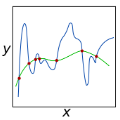Probabilistic Circuits (PCs) are a promising avenue for probabilistic modeling. They combine advantages of probabilistic graphical models (PGMs) with those of neural networks (NNs). Crucially, however, they are tractable probabilistic models, supporting efficient and exact computation of many probabilistic inference queries, such as marginals and MAP. Further, since PCs are structured computation graphs, they can take advantage of deep-learning-style parameter updates, which greatly improves their scalability. However, this innovation also makes PCs prone to overfitting, which has been observed in many standard benchmarks. Despite the existence of abundant regularization techniques for both PGMs and NNs, they are not effective enough when applied to PCs. Instead, we re-think regularization for PCs and propose two intuitive techniques, data softening and entropy regularization, that both take advantage of PCs' tractability and still have an efficient implementation as a computation graph. Specifically, data softening provides a principled way to add uncertainty in datasets in closed form, which implicitly regularizes PC parameters. To learn parameters from a softened dataset, PCs only need linear time by virtue of their tractability. In entropy regularization, the exact entropy of the distribution encoded by a PC can be regularized directly, which is again infeasible for most other density estimation models. We show that both methods consistently improve the generalization performance of a wide variety of PCs. Moreover, when paired with a simple PC structure, we achieved state-of-the-art results on 10 out of 20 standard discrete density estimation benchmarks.
翻译:概率巡回(PCs)是概率建模的一个很有希望的渠道。 它们把概率图形模型(PGMs)和神经网络(NNs)的优势结合起来。 然而,它们显然是可移动的概率模型,支持高效和精确地计算许多概率推断查询,如边际和MAP。 此外,由于PCs是结构化的计算图表,它们可以利用深层次学习式的参数更新,大大改善了它们的可缩放性。然而,这种创新还使得PCs容易被过度配置,这在许多标准基准中都观察到。尽管PGMs和NNS都存在丰富的正规化技术,但它们在应用到PCs时却不够有效。相反,我们重新思考PCs的正规化,并提出两种直线性技术,即数据软软化和整流化的规范,在计算图表中,数据的精确化提供了一种有原则性的方式,在封闭的数据集的形式上增加不确定性,在最隐含的定期的固定性标准化的浓度参数中,通过软性的PCrentral 的公式来学习一个软的常规分配。



